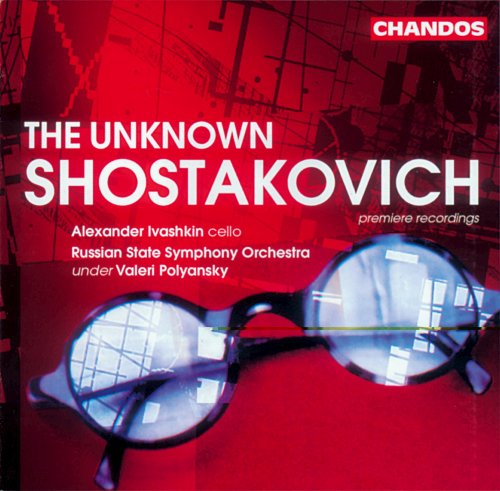
Alexander Ivashkin, Valeri Polyansky, Russian State Symphony Orchestra - The unknown Shostakovich (2000)
BAND/ARTIST: Alexander Ivashkin, Valeri Polyansky, Russian State Symphony Orchestra
- Title: The unknown Shostakovich
- Year Of Release: 2000
- Label: Chandos Records
- Genre: Classical
- Quality: FLAC (image+.cue,log,scans)
- Total Time: 59:38
- Total Size: 263 Mb
- WebSite: Album Preview
Tracklist:
Ervin Dressel "Der arme Columbus"
Overture (Entr'Acte), Op. 23 (orc. Shostakovich)
1. Allegretto poco moderato 3'41
Boris Tishchenko
Concerto for cello and orchestra №1 (orc. Shostakovich)
2. Andante - poco a poco animato - poco a poco ritenuto - andante 29'27
Robert Schumann
Cello Concerto in A minor, Op. 129 (orc. Shostakovich, Op. 125)
3. I. Nicht zu schnell 12'28
4. II. Langsam - 3.42
5. III. Sehr lebhaft 7'40
Dmitry Shostakovich
Two Preludes (Orc. Schnittke)
6. A minor Allegro moderato e scherzando 0'48
7. G major Andante 1'45
Performers:
Alexander Ivashkin, cello
Russian State Symphony Orchestra
Valeri Polyansky, conductor
Ervin Dressel "Der arme Columbus"
Overture (Entr'Acte), Op. 23 (orc. Shostakovich)
1. Allegretto poco moderato 3'41
Boris Tishchenko
Concerto for cello and orchestra №1 (orc. Shostakovich)
2. Andante - poco a poco animato - poco a poco ritenuto - andante 29'27
Robert Schumann
Cello Concerto in A minor, Op. 129 (orc. Shostakovich, Op. 125)
3. I. Nicht zu schnell 12'28
4. II. Langsam - 3.42
5. III. Sehr lebhaft 7'40
Dmitry Shostakovich
Two Preludes (Orc. Schnittke)
6. A minor Allegro moderato e scherzando 0'48
7. G major Andante 1'45
Performers:
Alexander Ivashkin, cello
Russian State Symphony Orchestra
Valeri Polyansky, conductor
The title of this disc is somewhat misleading, as there is very little music on it originally composed by Shostakovich. The Overture (Entr’Acte) to Poor Columbus was written by Shostakovich at the behest of Soviet officials to add the appropriate political “spin” to Ervin Dressel’s opera. It’s in the chaotic style of the Russian master’s other theater works of the period, notably The Nose and The Bolt. Cut from the same stylistic cloth are the Two Preludes of 1920, orchestrated by Alfred Schnittke to sound nearly as if written by Shostakovich himself. The disc’s two main works are orchestrations. One is Shostakovich’s thorough reworking of Robert Schumann’s cello concerto, undertaken at the prompting of Mstislav Rostropovich who premiered the new version. Its beginning sounds like Schumann, but before long we are in the strange world of Schumann’s notes and Shostakovich’s sounds. The squealing, piccolo-led woodwinds and the mocking trumpet definitely make the dour first movement more colorful, though it’s questionable whether or not this is an improvement. The harp in the second movement is an inspired touch, and the finale benefits most from Shostakovich’s explicit style.
Shostakovich presented his (apparently unrequested) reorchestration of his student Boris Tishchenko’s Cello Concerto No. 1 to the composer as a 30th birthday present. The older composer was concerned about the cello being swallowed up by the brass, and so produced a score that is very much in his own style. In fact, it has much in common with Shostakovich’s own Cello Concerto No. 2 in that there are many long-winded and ruminative passages for the cello against bleak harmonies and spare orchestration. The piece does have its dramatic moments though, and makes its points intermittently. Cellist Alexander Ivashkin gives his all in these tour de force solo readings, and Valeri Polyansky and the Russian State Symphony Orchestra are powerfully convincing. Chandos’ recording captures every sound, musical and otherwise, of Ivashkin’s instrument in a reverberant acoustic that does not flatter the orchestral tuttis.
Shostakovich presented his (apparently unrequested) reorchestration of his student Boris Tishchenko’s Cello Concerto No. 1 to the composer as a 30th birthday present. The older composer was concerned about the cello being swallowed up by the brass, and so produced a score that is very much in his own style. In fact, it has much in common with Shostakovich’s own Cello Concerto No. 2 in that there are many long-winded and ruminative passages for the cello against bleak harmonies and spare orchestration. The piece does have its dramatic moments though, and makes its points intermittently. Cellist Alexander Ivashkin gives his all in these tour de force solo readings, and Valeri Polyansky and the Russian State Symphony Orchestra are powerfully convincing. Chandos’ recording captures every sound, musical and otherwise, of Ivashkin’s instrument in a reverberant acoustic that does not flatter the orchestral tuttis.
Classical | FLAC / APE | CD-Rip
As a ISRA.CLOUD's PREMIUM member you will have the following benefits:
- Unlimited high speed downloads
- Download directly without waiting time
- Unlimited parallel downloads
- Support for download accelerators
- No advertising
- Resume broken downloads


